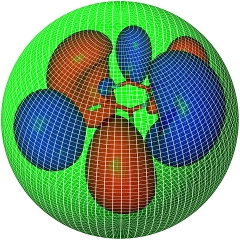Our research focusses on developing software to model molecular processes initiated by electrons, positrons and photons involving the electronic continuum using mainly R-matrix based approaches. Together with colleagues in the UK and abroad I develop high-quality, developer- and user-friendly, Atomic and Molecular high performance computing codes, in particular the UKRmol+ suite.
I current apply the softwre to the following scientific challenges:
- electron and positron-molecule collisions, in particular, the description of electronic excitation and resonance formation. Application to radiation damage, astrophysics and plasma technologies.
- environment mediated and enhanced electron induced processes, in particular the effect of microhydration on resonance formation in biologically relevant molecules and novel processes like interatomic coulumbic charge exchange.
- photoionization of small molecules and determination of cross sections, asymmetry parameters, ion yields, etc.
PhD project available for October 2024 start
Ab initio Studies of Interparticle Coulombic Electron Capture
Deadline for applications:18 April 2024
Electron capture by molecules is an important process that can be significantly enhanced or even enabled by the presence of an environment (other molecules or atoms). The environment mediated process is known as Interparticle Coulombic Electron Capture (ICEC) and was first predicted theoretically in 2010. In ICEC, an electron is attached to the target atom or molecule; the excess energy is then transferred to a nearby particle leading to its ionization. ICEC therefore leads to both a change in the species present in the medium and in the kinetic energy of free electrons. ICEC is part of a family of non-local processes mediated by the exchange of energy between neighbours in weakly bound systems.
Much is yet to be understood about ICEC and quantifying its effect could be crucial to model many processes of applied relevance and to guide and analyse experiments. Only a few ab initio theoretical studies of ICEC with molecules as the electron acceptor have been carried out so far and ICEC is yet to be confirmed experimentally. The aim of this project is to study ICEC for different systems (target molecule and surrounding particles) in order to understand its fundamental properties, provide data of applied relevance and guide experiments. Free electrons are present in a range of physical environments, from natural and man-made plasmas to matter subject to ionizing radiation. In many processes of applied relevance (e.g. radiation used in medicine for imaging and treatment), molecules are not isolated and the environment affects their interaction with the free electrons present. More details of the project can be found here.
Applicants must have graduated (or be about to graduate) with a degree in Physics, Chemistry or a related discipline and possess good undergraduate-level knowledge of atomic and molecular physics and/or theoretical chemistry. Experience of Linux or high-performance computing environments and software writing are also desirable but not essential.
The deadline for formal applications is 18 April 2024. Interviews will take place in the week beginning on22 April. For an informal discussion of this opportunity contact Jimena as soon as possible: Jimena.Gorfinkiel@open.ac.uk. For details on how to apply see the bottom of this page.
Special Issues
The Computer Physics Communications Special Issue on Software for attosecond chemistry, guest edited by Fernando Martin and Jimena D. Gorfinkiel is now available here.
The Special Issue on Scattering Beyond the Gas Phase in the Journal of Physics B: Atomic, Molecular and Optical Physics is now available here. The Guest Editors are Anne Lafosse, Aleksandar Milosavljevic, Jimena D. Gorfinkiel and James Sullivan.
